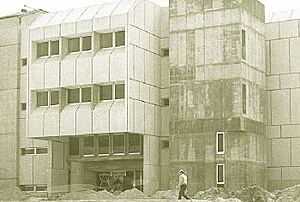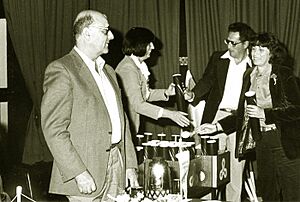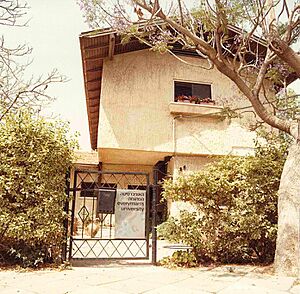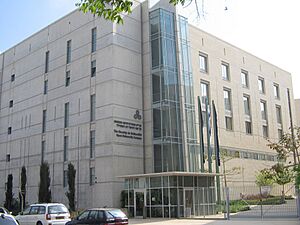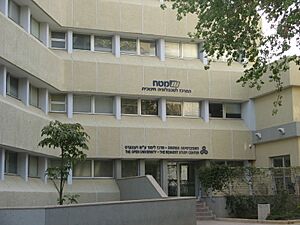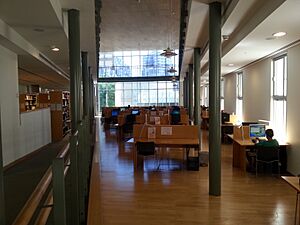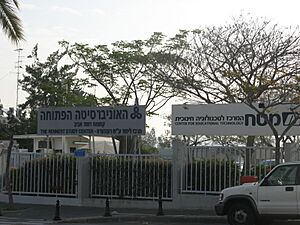Open University of Israel facts for kids
|
האוניברסיטה הפתוחה
|
|
| Motto | הרבה מעבר לתואר (Hebrew for "far more than a degree") |
|---|---|
| Type | |
| Established | 1974 |
| Chairman | (of the executive Committee): Uri Yaron |
| Chancellor | Dorit Beinisch |
| President | Mimi Ajzenstadt |
| Rector | Iris Shagrir |
| Director | Meir Bing |
| Students | 52,102 (2022) |
| Undergraduates | 49,399 (2022) |
| Postgraduates | 2,703 (2022) |
| Location |
Ra'anana
,
Israel
32°11′19″N 34°53′16″E / 32.18861°N 34.88778°E |
The Open University of Israel is a special kind of university. It focuses on distance learning. This means students can study from home or anywhere they have internet access. It's one of ten public universities in Israel. The Council of Higher Education (CHE) officially recognizes it.
The Open University uses technology to teach. Students mostly learn online. They can also join in-person or online study groups. The university has main campuses in Ra'anana, Tel Aviv, Jerusalem, Haifa, Beersheba, Givat Haviva, and Nazareth. There are also about fifty smaller study centers across Israel. Many students study from their homes, both in Israel and around the world. To graduate, students must complete their courses and be good at English. The university offers bachelor's and master's degrees. It also has a special doctoral program in Education. This program focuses on how technology helps people learn.
Contents
History of the Open University
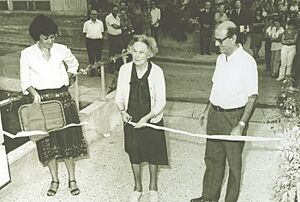
The idea for the Open University started in 1971. A group led by Professor Shneior Lifson suggested creating a university like the Open University in the UK. The Edmond de Rothschild Foundation (Israel) liked the idea. They offered to help pay for it. In 1973, the government and the CHE decided to create a "university for all."
In 1976, the Open University officially opened. Its main office was in Ramat Aviv. It started with 2,267 students and offered five courses. The university had 130 employees. This included nine senior teachers and 31 teaching staff. In 1988, the university changed its name. It went from "Everyman's University" to "The Open University of Israel."
In 1995, an agreement was made with the city of Ra'anana. This led to building the Dorothy de Rothschild campus. By 2004, the new main campus in Ra'anana was finished. The university's main offices moved there.
How Students Learn
Academic Departments
The Open University has seven main study areas. These are called academic departments:
- History, Philosophy and Judaic Studies
- Language, Literature, and the Arts
- Mathematics and Computer Science
- Natural and Life Sciences
- Management and Economics
- Sociology, Political Science, and Communication
- Education and Psychology
Study Method
At the Open University, you study one course at a time. It's different from traditional universities. They often have you study a whole year or program at once. All courses are made for you to study on your own. You use special textbooks and online materials.
Course websites have extra study tools. They also have places to talk with teachers and other students. You can choose to attend in-person or online classes. These classes help you review what you've learned. Teachers manage their courses. They create assignments and exams. They also check the course websites. Tutors help review material in weekly or bi-weekly sessions. They also grade assignments.
Study Programs
Courses are grouped into study programs. To get a degree, students need to earn enough credits. This is usually 120 credits. The Open University offers bachelor's, master's, and doctoral degrees. You can also get special diplomas.
Students can get a general degree in subjects like humanities or social sciences. Or, they can focus on a specific subject. Most subjects offer single or dual-subject degrees. Currently, the university has one PhD program.
Transferring Credits
The Open University has a special program. It lets students start studying without strict admission rules. If students do well in certain courses, they can transfer. They can then be accepted into other traditional universities in Israel. This is a great way to start university studies.
Research and Innovation
The university has a Research Authority. It helps teachers with their research. This includes finding money for projects. It also helps them publish their studies. The Research Authority helps researchers work with other universities.
Research Centers
The Open University has several research centers. These centers bring together experts from different fields. They work together to create new scientific knowledge. They also partner with other researchers in Israel and worldwide.
- Research Center for Innovation in Learning Technologies: This center looks at new ways to use technology in learning. It helps teachers improve how they teach. It also helps integrate new technologies into courses.
- The Institute for the Study of Relations between Jews, Christians, and Muslims: This institute supports research about these three religions. It also organizes events to help people understand each other better.
- Astrophysics Research Center (ARCO): This center studies space. It looks at topics like cosmology (the study of the universe), gravity, and planetary science (the study of planets).
- Open Media and Information Lab (OMILab): This lab works on digital projects. It brings together researchers from different areas. These include sociology, computer science, and education.
Academic Publishing
The Academic Development and Publishing Department creates and publishes course materials. Teams of teachers, advisors, editors, and designers work together. The university publishes books under two names: Lamda Scholarship and Lamda Books.
Lamda Scholarship publishes new research books. These are mainly in humanities and social sciences. Lamda Books publishes textbooks for students. These books are sold in bookstores and online. They help students at the Open University and other schools.
Technology in Distance Education
The Shoham Center helps create and use technology for teaching. They develop online learning tools. They also create online exam systems. The center has modern video studios. They use these for live broadcasts and making educational videos.
Student Life
More than 50,000 students are currently studying at the Open University. Many different types of students choose this university. Its flexible system helps people who might not fit into traditional universities.
For example, many adults who work full-time study here. High school students can also take university courses. This is part of the "Academia in High School" program. Soldiers can even combine their studies with military service. The university also supports students studying from other countries. They also help students with disabilities.
Student Association
The Open University has a student association. It offers services and activities for students. They have projects to help students with their studies. They also encourage students to volunteer. For example, they work with groups that help with mental health or humanitarian aid. The association tries to meet the needs of all students.
University Leadership
The Open University has had many leaders over the years. Here are some of the people who have served as Presidents and Rectors.
Presidents
| Portrait | Name | Began tenure | Ended tenure |
|---|---|---|---|
 |
Max Rowe | 1976 | 1977 |
 |
Abraham Ginzburg | 1977 | 1987 |
 |
Nehemia Levtzion | 1987 | 1992 |
 |
Menahem Yaari | 1992 | 1997 |
 |
Eliahu Nissim | 1997 | 2003 |
| Gershon Ben-Shakhar | 2003 | 2008 | |
 |
Hagit Messer Yaron | 2008 | 2013 |
 |
Jacob Metzer | 2013 | 2018 |
 |
Mimi Ajzenstadt | 2018 | 2023 |
 |
Leo Corry | 2023 | - |
Rectors
| Portrait | Name | Began tenure | Ended tenure |
|---|---|---|---|
 |
Shneior Lifson | 1974 | 1975 |
 |
Abraham Ginzburg | 1977 | 1987 |
 |
Yona Peles | 1977 | 1987 |
 |
Israel Shatzman | 1979 | 1984 |
| Shalom Reichman | 1984 | 1986 | |
 |
Ruth Beyth-Marom | 1966 | 1999 |
 |
Judith Gal-Ezer | 1999 | 2005 |
 |
Ora Limor | 2005 | 2009 |
 |
Judith Gal-Ezer | 2009 | 2012 |
 |
Tamar Hermann | 2012 | 2013 |
 |
Aviad Heifetz | 2013 | 2017 |
 |
Sara Guri-Rosenblit | 2017 | 2019 |
 |
Guy Miron | 2019 | 2023 |
 |
Iris Shagrir | 2023 | - |
See also
 In Spanish: Universidad Abierta de Israel para niños
In Spanish: Universidad Abierta de Israel para niños
 | Charles R. Drew |
 | Benjamin Banneker |
 | Jane C. Wright |
 | Roger Arliner Young |


